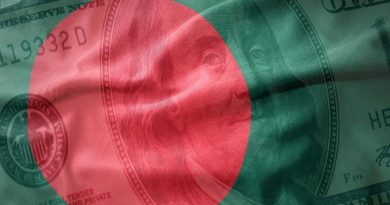As the United States moves to impose sweeping tariffs on countries lacking bilateral trade agreements, Bangladesh has entered the final phase of high-stakes negotiations in Washington, scrambling to avoid a potential 35% tariff on its exports.
The urgency follows a statement by former US President Donald Trump on July 28 from his golf resort in Scotland, where he warned that countries failing to secure tailored trade deals with the US would face tariffs of 15% to 20%, adding, “We can’t sit down and make 200 deals.”
The proposed duties, which come on top of an existing 10% baseline tariff imposed in April, have triggered a global rush among US trading partners to secure exemptions or agreements. Countries such as Pakistan, Thailand, and Canada are engaged in last-ditch talks, while India has already been hit with a 25% tariff after bilateral negotiations broke down.
Dhaka Seeks Urgent Breakthrough
Bangladesh, which exported $8.2 billion in goods—primarily ready-made garments—to the US in 2024, is under mounting pressure to finalise a deal before the August 1 deadline. A delegation led by Commerce Adviser Sk Bashir Uddin is currently in Washington for what officials describe as make-or-break talks.
Joining the delegation are National Security Adviser Khalilur Rahman, Commerce Secretary Mahbubur Rahman, and Additional Commerce Secretary Nazneen Kawsar Chowdhury. On the US side, Assistant Trade Representative Brendan Lynch is heading the discussions.
“We are confident our position is being seriously considered,” said Commerce Secretary Mahbubur Rahman from Washington. “We’ve made major offers to help balance trade, and the tone of the meetings has been constructive.”
Trade Concessions to Woo Washington
In a strategic move, Bangladesh has reshaped its negotiating posture by offering a package of trade concessions aimed at reducing its $6 billion trade surplus with the United States.
Among the key proposals:
- Importing 3.5 million tonnes of US wheat over five years
- Acquiring 25 Boeing aircraft in a multibillion-dollar aviation deal
- Expanding purchases of US LNG, cotton, soybeans, and other agricultural products
Officials suggest these measures could increase annual US imports by $2 billion, especially if Bangladesh improves its port infrastructure and shipping logistics.
A senior Bangladeshi official, speaking on condition of anonymity, said, “If the government improves port facilities, we could significantly scale up imports of US soy and LPG.”
A Tariff Threat to Garment Industry
The stakes are high for Bangladesh’s economy. The ready-made garments (RMG) sector, which employs over four million workers, is particularly vulnerable. Analysts warn that any tariff beyond the current 10% could erode Bangladesh’s competitiveness, especially against rivals such as Vietnam and China, both of which enjoy deeper trade engagement with the US.
“Even a 15% tariff would hurt us. A 35% rate could devastate the industry,” said a senior executive of a Dhaka-based apparel conglomerate. “The US is our largest market. We need this deal.”
India Faces Tariff Fallout After Talks Collapse
While Bangladesh remains at the table, India has not been as fortunate. The US has already slapped a 25% tariff on Indian exports, following a breakdown in trade talks. Tensions escalated after New Delhi rejected US demands for access to sensitive agricultural sectors including wheat, rice, corn, and GMO soybeans, citing risks to smallholder farmers.
India’s exporters, especially in garments, pharmaceuticals, jewellery, and chemicals, are now bracing for economic fallout. In 2024, Indian exports to the US stood at $87 billion.
A Defining Moment for Bangladesh
With the deadline just days away, Dhaka is hoping to avoid a similar fate. Officials describe the ongoing discussions as critical for safeguarding the country’s export-driven economy and maintaining stability in a politically fragile global trade landscape.
“We are holding our breath,” said one official. “Whether we secure this deal or not could define our economic future.”
The outcome of the negotiations is expected to be announced within hours. Until then, Bangladesh’s economic trajectory hangs in the balance.






